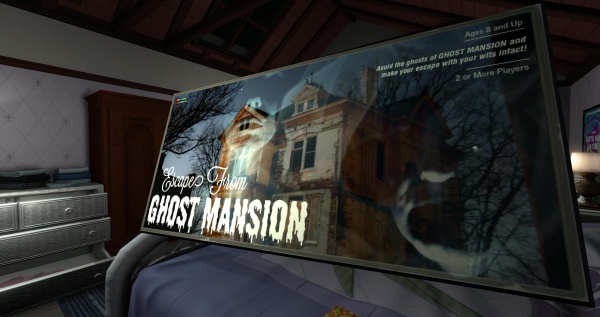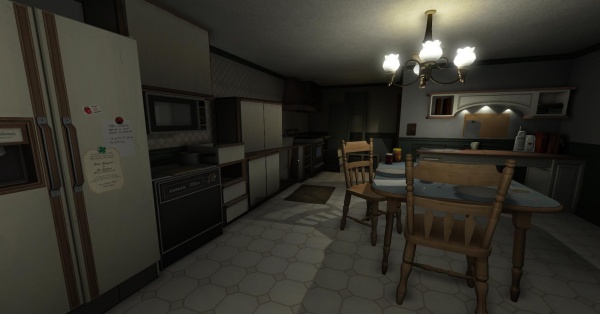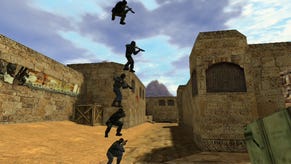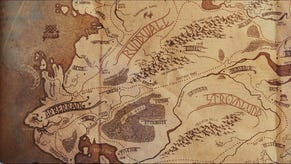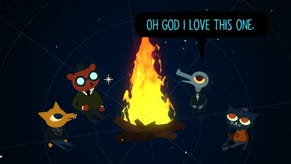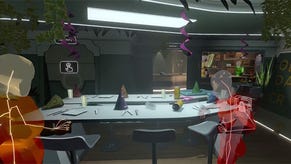Wot I Think: Gone Home
Where the heart is
You will be more interested to read about Gone Home after you've played it. And it will be more interesting to write about after everyone has played it. Gone Home is a wonderful game, and one that is fundamentally reliant on its being approached with a clean slate. If this is enough to convince you to give it a go, then perfect. If not, read on and I'll do my best to say as little as possible while relaying why it's so compelling. Here's wot I think:
Opening premises are safe. Let's start there. You're a 20 year old girl called Kaitlin, arriving to an unfamiliar family home after a year of travelling around Europe. Your family moved while you were away, to a surprisingly large mansion house, and you're going there for the first time. Except no one's home.
The very first thing you see, in the first-person adventure, is a note from your younger sister, Sam, taped to the front door. She's appealing to you not to find out where she's gone, but promises she'll be home some day. From here on this is a game of simply exploring an unfamiliar house, filled with quite literally the familiar, piecing together the last year of your family's lives.
It's remarkable how little can be said of what this entails, despite its relative mundanity. But it's the mundanity that makes Gone Home so damned special. It's ordinary, recognisable, relatable. It's a house, and we've been in those. It's not a spaceship or government headquarters or battle-strewn desert. It's a home.
But it's a home that's simultaneously peculiar, unknown, and distant. You've never been there before, and nor indeed has Katie. One of Gone Home's most masterful moves is to allow you to share in this contemporaneous experience of known and unknown, safety and yet alienation. Why is no one home? How serious is the storm outside that seems to have taken the TV down? Where is Sam? What's up with mum and dad?
Everything is learned through poking about. Drawers and cupboards can all be explored, items picked up and examined (and importantly, carefully put back where they came from, if that matters to you). Letters can be read, locked cabinets opened, personal effects rifled through. And throughout, key items will be accompanied by narration from your sister Sam.
That's explained in the opening missive. Sam explains that since she's always told her big sister everything, now that you're away she's going to write it all down in diary entries as if directed at you. It's through these entries that perhaps the core story is told. But it's just one of three main narratives that are there to be discovered, all of which are compelling.
The house is beautifully presented. Everything is superbly realised, capturing the game's setting of 1995 without labouring the point. (The era is portrayed not through awkwardly placed headlines nor clumsy declarations of who is the president, etc, but rather through underground musical tastes, technology, and common sense.) Objects like cereal boxes are rendered with more care than the average game puts into an entire kitchen, and that's if you're lucky enough to be playing a game that remembers humans tend to need and use kitchens.
The other most outstanding feature is the representation of a teenage life. While slightly faltering at the very start, Sam is soon established as defiantly and brilliantly 16/17. Her passion, fire, and studious uninterest is incredibly honest in its telling, and all the more impressive since she's never actually there. Her story is utterly gorgeous, so wonderfully allowing you to not only nostalgically reflect on that time in your own life, but crucially, empathise rather than patronise. It's so often so easy, when remembering or observing teenage life, to condescend to the emotions and actions. To misunderstand that because you've forgotten the intensity of your feelings at the time, that they were in some way less valid or less real. Gone Home is a game that knows that feelings are real as they are experienced, and does not diminish them. And that's a joy.
There is one area that's deserving of criticism, but it's hard to know how it could have been done better. It's undeniable that in order to let you uncover the stories of the last year in chronological order, things do have to become a little contrived. Locked doors and hidden keys are the solution here, which is about as gamey as can be, and certainly incongruous with the defiantly non-gamey setting. You also do have to wonder why personal letters are left in easily discovered places, and indeed why year-old correspondence is still at the top of piles. I wish it were more easily dismissible, but when a game is so focused on reality, unreality does stick out rather. You'll not be able to avoid thinking, "But... but why would that be there? Why would that door be locked?"
But this certainly wasn't serious enough to impede on a uniquely engrossing game. Beyond finding the items you need to progress further through the house, nothing is obligatory here. You could emerge at the other end having missed swathes of your family's tale, not learned various mysteries of the building, or not have pieced together various elements, were you not to explore every nook and drawer. The game's lack of panic about ensuring you see and hear everything is refreshing, and in turn it gratifies to be rewarded with nuggets because you meticulously ransacked. (But then put everything back in place, surely?)
I presume you could race through the game in an hour if you were ridiculous enough. It took me three or four, and I absolutely adored it. It's touching, unsettling, deeply honest, and enormously compassionate. Which is a word you far too rarely get to use of games.



